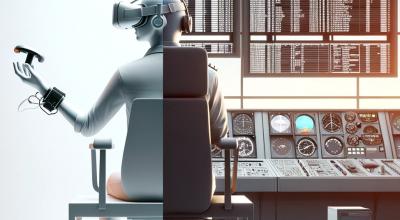Immersion & Interaction
Qu’il s’agisse de réalité augmentée ou d’interactions au sein de mondes totalement virtuels, la transformation numérique repousse les limites de l’impact des technologies de l’information et de la communication sur nos sociétés et industries. Les applications reposant sur l’emploi de technologies d’immersion et d’interaction, ne pourront être viables sans permettre un confort d’usage au plus proche de notre perception naturelle du monde qui nous entoure et avec lequel nous interagissons.

Afin d’y intégrer pleinement le facteur humain, ces travaux intègrent les dimensions de collaboration, de perception de présence et de co-présence, de scénarisation d’interactions et de technologies cognitives. Ils induisent aussi la question de l’interface humaine avec cette représentation virtuelle, ancrées d’une manière ou d’une autre en superposition sur le monde réel. Les technologies de réalité mixte, intimement liées à celles de jumeaux numériques, permettent une innovation radicale en matière de production industrielle : réduction de l’empreinte énergétique, maintenance prédictive, optimisation logistique...

A la croisée des Sciences Cognitives et des Facteurs Humains, nous définissons les innovations qui placent l’humain, à la fois comme sujet et finalité de la recherche technologique.

Nous voulons rendre possibles les applications de réalité augmentée dans des environnements complexes, comme les usines ou les chantiers. Contrôle de conformité, aide à la maintenance ou à l’assemblage, aide à la navigation, maintenance prédictive : nombreux sont les cas d’usage industriels où s’appliquent nos expertise en réalité mixte.



